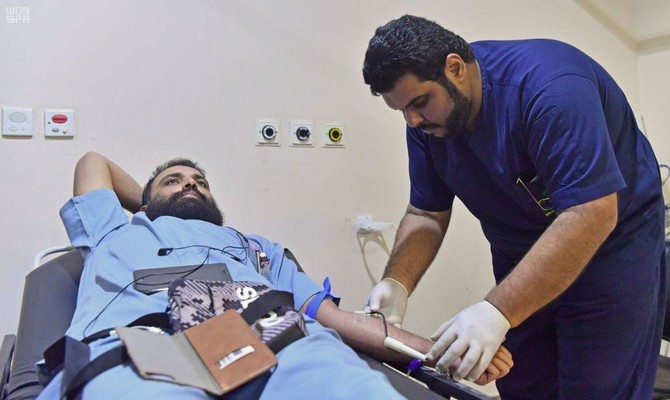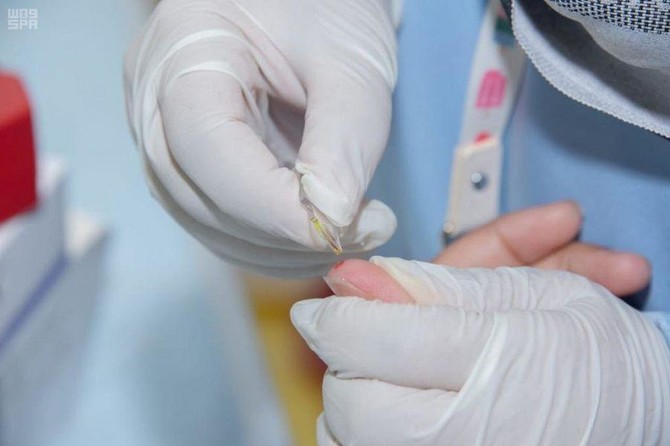JEDDAH: Saudi Arabia’s Ministry of Health organized a blood donation campaign for hospital staff to stock up supplies ahead of Hajj.
Entitled “The World in the Heart of the Kingdom,” the campaign collected blood from employees at Mina’s main emergency hospitals, including Mina Al-Jaser, Mina Al-Wadi, and Mina Shara Jadid.
The drive is part of the health ministry’s efforts to strengthen hospital services for pilgrims.
Health workers, including nurses, doctors and administrators, as well as scouts, and security personnel volunteered to donate blood.
The hospitals also organized several lectures and training courses for emergency workers and 11 outpatient clinics have been equipped with barcode scanners to scan electronic wristbands used to record patients’ information.
Meanwhile, the Ministry of Health confirmed there had been no cases of epidemics or quarantine disease among the pilgrims arriving for Hajj season.
More than 1.6 million pilgrims have been provided with preventive services through health outlets since Aug 12
The ministry’s hospitals in Makkah and Madinah continue to provide specialized services for pilgrims, during the Hajj season.
The hospitals carried out 187 cardiac catheterizations and 10 open heart operations, and 1,280 blood transfusions.
The ministry also provided emergency services in Makkah and Madinah hospitals to 280,773 pilgrims, with 17,820 pilgrims visiting clinics, and medical centers receiving 246,156 outpatients, the ministry stated.
For Hajj, the Ministry of Health follows developments and changes in the global health situation, in cooperation with the World Health Organization (WHO) and other internationally-recognized health bodies, such as the International Centers for Disease Control.
Saudi health ministry organizes blood donation campaign for Hajj pilgrims
Saudi health ministry organizes blood donation campaign for Hajj pilgrims

SRMG launches G.O.A.T, AI-powered sports platform for data-driven fans

- The launch comes at a time when Saudi Arabia is increasingly at the center of global sport
- The app complements live broadcasts by keeping fans connected before, during, and after the game
RIYADH: The Saudi Research and Media Group (SRMG) on Tuesday announced the launch of G.O.A.T, a new sports app designed to deliver fast, credible, and curated coverage in one destination. Built for a mobile-first generation, G.O.A.T is designed for a sports landscape evolving at unprecedented speed.
The launch of G.O.A.T comes at a time when Saudi Arabia, and the region more broadly, are increasingly at the center of global sport. Saudi football in particular is undergoing rapid transformation, emerging as one of the fastest-growing and most closely followed leagues in the world.
As fan behavior evolves alongside this growth, audiences are no longer looking only for headlines, but for trusted context, real-time access, and platforms that reflect how sport is experienced today.
Created to meet these expectations, G.O.A.T is an audience-first, data-driven app built for the AI age. It brings together real-time updates, breaking news, video highlights, and match insights in a simple, always-on experience designed around fan behavior and matchday flow.
The app complements live broadcasts by keeping fans connected before, during, and after the game, from instant goal alerts to key stories, highlights, and the conversations shaping matchday momentum across screens and platforms.
The launch marks the first phase of G.O.A.T’s rollout, initially focusing on football and the Saudi Pro League, alongside coverage of the world’s most prominent competitions. In its early release, the app serves as a leading destination for up-to-the-minute Saudi football news, grounded in SRMG’s editorial standards and designed to cut through misinformation and noise that increasingly dominate sports coverage.
In its initial release, G.O.A.T curates content from SRMG’s most trusted brands, including Arriyadiah, Asharq Al Awsat, Asharq Sports, and Sport 24, giving fans access to reporting, analysis, and match coverage from the region’s most established newsrooms through one unified product experience.
As the platform evolves, G.O.A.T is expected to unlock new monetization opportunities aligned with fan behavior and premium engagement. These include intelligent sponsorship integrations, data-driven brand partnerships, and premium experiences built around key moments and competitions. Designed as a scalable product platform, G.O.A.T enables brands, leagues, and partners to connect with highly engaged sports audiences through context-rich formats that enhance rather than disrupt the fan experience.
The launch of G.O.A.T also marks another step in SRMG’s expansion across the sports media ecosystem, following the group’s acquisition of exclusive rights to broadcast the Saudi Pro League across the Middle East and North Africa through Thmanyah.
Alaa Shahine Salha, Content Development Managing Director at SRMG, said:
“G.O.A.T was built around a simple idea. Sports fans need speed, depth, and credibility in one place. This first phase establishes a strong editorial and community foundation. What comes next will expand how fans interact with content, match moments, and each other, powered by a smarter, data-led experience.”
Looking ahead, SRMG will continue to evolve G.O.A.T through interactive and community-driven features that deepen participation and bring fans closer to the action, while maintaining a clear commitment to credibility and responsible reporting.
G.O.A.T is now available to download on iOS and Android.















